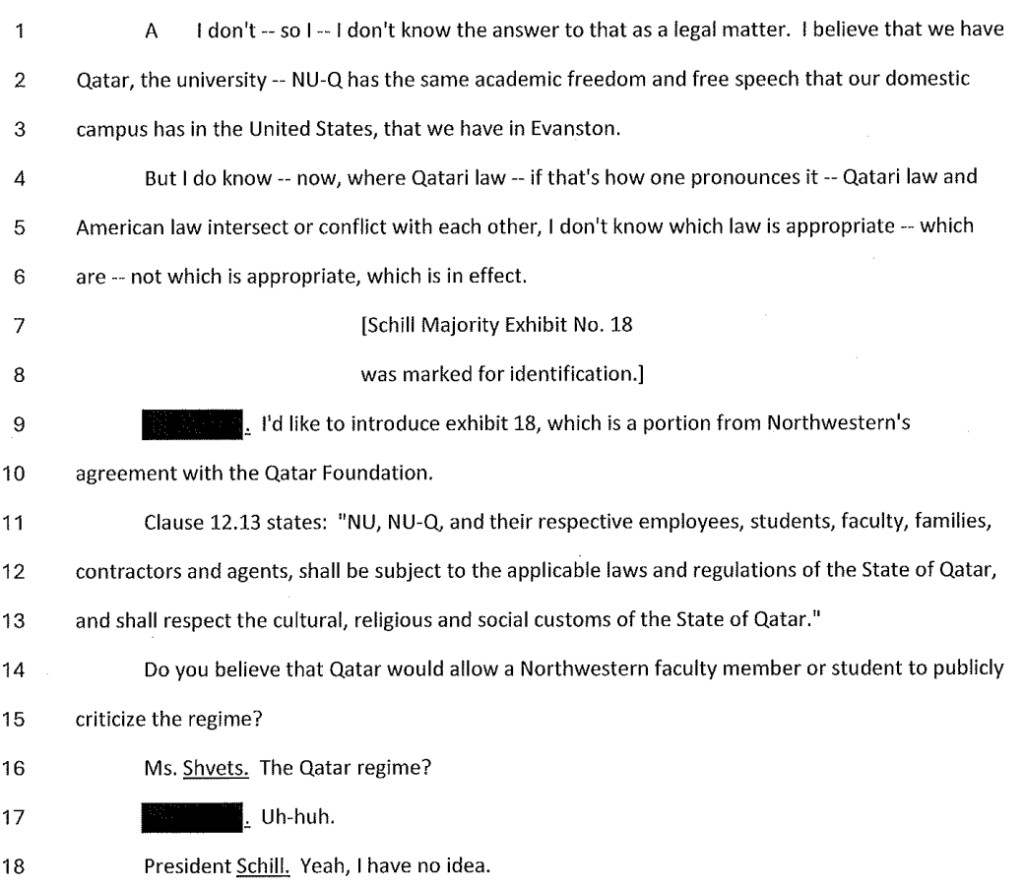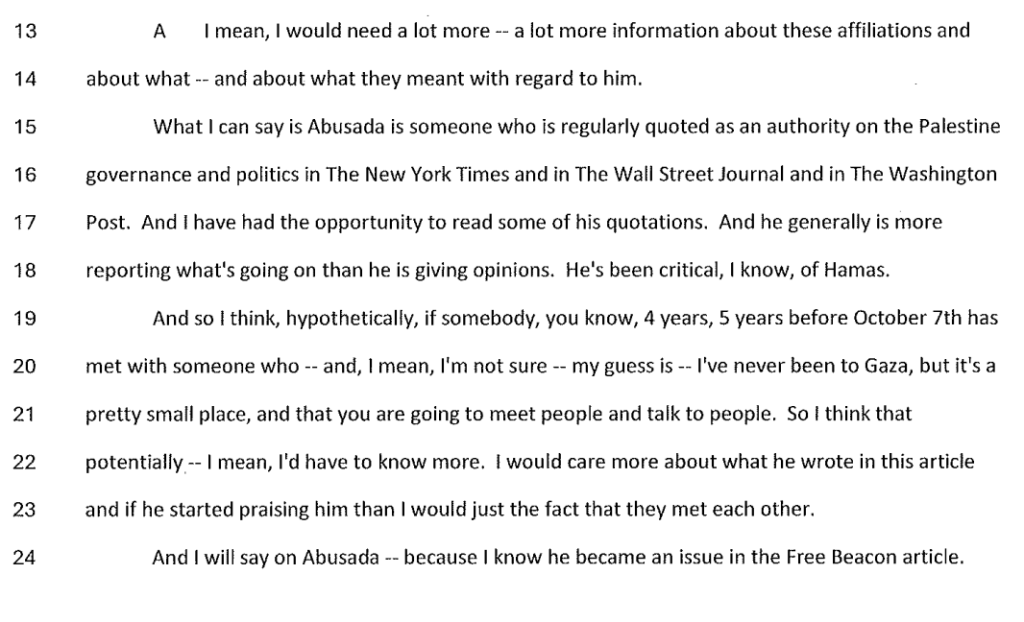Northwestern University’s contract with Hamas-allied Qatar, where the school operates a satellite campus, includes a clause that effectively forbids students and faculty from criticizing the Qatari regime, a House Committee on Education and Workforce interview with soon-to-be-former Northwestern University president Michael Schill revealed.
The interview, which includes an extensive discussion of Norwestern’s contract with the regime-controlled Qatar Foundation, reveals the speech limitations to which universities submit when they operate in the Gulf state.
In the August 5 interview, committee staffers introduced “a portion from Northwestern’s agreement with the Qatar Foundation,” the nonprofit organization chaired by the emir of Qatar’s mother. The foundation bankrolls the presence of Northwestern and other American universities in the Gulf state. The agreement includes a clause stipulating that “NU, NU-Q, and their respective employees, students, faculty, families, contractors and agents, shall be subject to the applicable laws and regulations of the State of Qatar, and shall respect the cultural, religious and social customs of the State of Qatar.”
Qatar’s penal code criminalizes criticism of its government and flag and bans the posting of online content that the Qatari regime deems harmful. A Jordanian media manager for Qatar’s 2022 World Cup was sentenced to five years in prison after voicing concern over the regime’s treatment of migrant workers. A Northwestern Qatar student, meanwhile, was “arrested over a tweet,” according to the House interview.
Asked during that interview whether Northwestern Qatar operates “in accordance with all Qatari laws,” Schill responded, “I believe it has to.” Asked whether that “includes Qatari censorship laws,” Schill said, “I don’t know the answer to that as a legal matter.” He also said he had “no idea” whether Qatar “would allow a Northwestern faculty member or student to publicly criticize the regime.”


The revelation provides a window into the control Qatar exerts over Northwestern. Aside from the contract clause, Schill confirmed in his House interview that anti-Semitism training offered at Northwestern’s main campus is not offered in Qatar.
“I don’t know what the reason would be” for that disparity, Schill said.
House investigators also pressed Schill about emails sent by Qatar Foundation staffers to the dean of Northwestern Qatar. One message, sent two weeks after Hamas’s Oct. 7 massacre, provides talking points on “diplomatic role and mediation efforts in Palestine/Gaza and Afghanistan – along with reactions from international politicians.”
A second email sent on Oct. 12 from a Qatar Foundation staffer named “Francisco”—an apparent reference to Francisco Marmolejo, the foundation’s president of higher education—includes a statement from the foundation’s CEO. “Finally, let there be no doubt about this – QF always has and always will stand with Palestine,” the statement concludes. It was sent not just to Northwestern but to the deans of all U.S. universities in Doha. Georgetown University, Carnegie Mellon University, and Weill Cornell Medicine all operate campuses there.
Northwestern, which did not immediately respond to a request for comment, opened its Qatar campus in 2008. Since then, Schill testified, Qatar has provided the school with $737 million. “Basically 90 percent” of that money “covers direct costs of the Qatar campus,” he said. The rest benefits Northwestern’s U.S. campus, funding things like “indirect costs and overhead” and a “quasi-endowment” at the School of Communications. Schill called that financial benefit “meager.”
It’s unclear how and whether Northwestern’s relationship with Qatar will continue after the contract expires in 2028. Schill said the school is conducting a “multiyear review” of that relationship.
Schill will not be involved in that review. He announced his resignation on Thursday amid Northwestern’s protracted battle with the Trump administration, which stripped $790 million in federal funding to the school over its response to campus anti-Semitism.
That response defined Schill’s tenure as president.
When anti-Israel student radicals pitched tents on campus in violation of school rules last spring, Schill declined to “use force to remove the tents,” he said during the House interview, because Northwestern’s police force was too “tiny” and school administrators feared some encampment participants may have been armed. Instead, Schill negotiated with those participants, deploying two faculty members, Middle Eastern studies professor Jessica Winegar and management professor Nour Kteily, to help him do so.
Amid the negotiations, text messages referenced during Schill’s interview show, Kteily texted another Middle Eastern studies professor, Wendy Pearlman, to say he hoped to “get some amazing wins for the encampment organizers.” When students demanded Northwestern divest from Israel as part of any deal to end the encampment, meanwhile, university provost Kathleen Hagerty texted Kteily to say it would be “pretty easy” to boycott the sale of Sabra hummus, adding, “I’m all for making a deal.”
“If the students really cared about actual divestment,” Hagerty wrote in another text to Kteily, “then they need the patience to actually do the work and make it happen.”
Schill was the first university president to strike a deal with encampment participants, none of whom were disciplined. It included commitments to hire two Palestinian professors and offer full scholarships to five students from Gaza.
Schill followed through by hiring Mkhaimar Abusada as a visiting associate professor of political science. Abusada, the Washington Free Beacon reported in May, serves on the board of two organizations that present themselves as human rights groups—the Independent Commission for Human Rights and Palestinian Center for Human Rights—but in reality maintain close ties to Hamas and Popular Front for the Liberation of Palestine terrorists. Last year, Abusada himself wrote of meeting the late Hamas leader Yahya Sinwar in 2018. The State Department sanctioned the Palestinian Center for Human Rights on Thursday.
Though Schill said he was not aware of those affiliations at the time of Abusada’s hiring, he appeared unbothered when they were raised during his interview with House investigators.
“I mean, I would need a lot more – a lot more information about these affiliations and about what – and about what they meant with regard to him,” he said. “What I can say is Abusada is someone who is regularly quoted as an authority on the Palestine governance and politics.”
“And so I think, hypothetically, if somebody, you know, 4 years, 5 years before October 7th has met with someone who – and, I mean, I’m not sure – my guess is – I’ve never been to Gaza, but it’s a pretty small place, and that you are going to meet people and talk to people,” Schill continued. “I don’t know whether a seasoned professor who is doing the politics of Gaza could avoid getting to know some of these people, or whether that would be not doing his job right.”
In May, Northwestern extended Abusada’s appointment to August 2026, according to the interview.

Schill will remain Northwestern’s president until an interim leader is appointed, at which point he will take a sabbatical before returning as a professor in the law school. Hagerty remains in her Northwestern provost role.

















